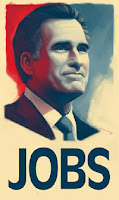Imagine: It's November And Romney and Obama are locked in battle
Republicans always hand the
presidential nomination to the candidate who is the ‘next-in-line.’” Every
observer of presidential politics has encountered this theory. The idea is
basically this: Republican presidential nominating contests are governed by a
law that, in essence, allows the candidate who is “next in line” to receive the
nod: Mitt Romney came in second to John McCain, who came in second to George W.
Bush; Bob Dole came in second in 1988, Ronald Reagan came in second in 1976.
If this is true, then Mitt Romney’s nomination was
basically inevitable and the other candidates never really had a chance. To
mainstream Republican voters, despite their reluctance to accept him, there was
simply no plausible alternative. But it is awfully difficult to imagine that a
principled, articulate, experienced conservative alternative could not have
upended him. It is a testimony to Romney’s breathtaking weakness
as a candidate that Rick Santorum, of all people, was able to give him a scare.
 |
| Rick Santorum |
But the withdrawal of Republican presidential hopeful
Rick Santorum from the nomination race leaves Mitt Romney as his party's clear
frontrunner and sets up a potentially intriguing battle for the White House in
November. If, even 10 years ago, pundits had said the contest
for the United States presidency in 2012 would be between a black Democrat and
a Mormon Republican, few would have believed them.
In reality, the color of each candidate and his
respective religion is likely to be largely irrelevant when the country goes to
the polls.
Throughout his presidency, Barack Obama, hostage to
potential claims of hypersensitivity and fearful of white voter backlash, has
been careful not to highlight overly the delicate issue of race.
.jpg) |
| Christian Exodus |
Mitt Romney has most likely already come to the
conclusion the Christian evangelical wing of the Republican Party, which
flocked to Mr. Santorum, is a lost cause for him - and that there is more profit
for him in the centre ground among moderate independents as yet unconvinced
President Obama has earned another term.
The influential factors in the forthcoming contest,
which barring an unpredictable and extraordinary event - Newt Gingrich and Ron
Paul remain theoretically in the running for the Republican spot - are the
state of the US economy, economic fairness, and the contrasting personalities
of the two likely candidates.
Mr. Romney will make most of his running on the first of these, being a successful and wealthy businessman with a personal fortune estimated at about $US 250 million.
Mr. Romney will make most of his running on the first of these, being a successful and wealthy businessman with a personal fortune estimated at about $US 250 million.
He will be quietly hoping the stuttering economy
fails to find a fluent and sustained growth spurt until after the election,
thus being able to paint the President as a poor steward in such matters.
He will, likewise, portray the Democrats'
redistributive tax policies - on which President Obama has been campaigning -
as harmful to the economy and bordering on European-style socialism.
These contests have been fiercely fought, with
bitterness and bile writ large. Much was made of the way in which the
multimillionaire made his wealth (through his involvement with private equity
firm Bain Capital, which in part made its fortunes by closing down businesses
and adding to the country's woeful unemployment statistics).
Ranged against him has been a collection of
fractious and flawed individuals whose policy platforms and ideologies
personify the splintered identity of today's Grand Old Party.
 |
| Rick Perry |
There was Rick Perry, who stumbled fatally in a
debate in which he could not recall which of the Government departments he
would immediately shut down.
Michele Bachmann's star rose dramatically and waned
almost as pointedly on revelations as to her shortcomings as a candidate.
Herman Cain withdrew after running into "women
trouble". Mr Santorum, the darling of the religious right, flirted with
such electorally volatile issues as contraception - he is against it.
Mr Gingrich, still running but millions of dollars
in debt, flung mud.
So pointed at times was the commentary from some
opponents and members of Mr Romney's own party, observers could have been
forgiven for repeating an old saying: with friends like these, who needs
enemies?
Members of the re-elect Barack Obama team must have
on occasion pinched themselves. Then there is the challenger's flat presentational
style. Try as he might to inject enthusiasm and passion
into his speeches, Mr. Romney strains for effect and seems rehearsed. He has thus far barely sparked the imaginations of
Republicans, let alone the undecideds.
With, arguably, an ideal profile for Republican
candidacy - rich, white, male businessman - there remains a stubborn feeling he
will go to the August convention as the candidate who won his party's ticket by
default.
This is not always a bad place to be. President
Obama, who will continue to make much of economic disparity and a taxation
system that favors rich people, such as himself and Mr. Romney, at the expense
of low and middle-income workers, will be wary of this factor. When the
campaign proper gets under way, anything could happen.
Finally, a telling note: are all of these
next-in-line theorists rushing to declare that, after Romney’s time has come
and gone, Rick Santorum will be the next Republican presidential nominee? Do
these people think that Chris Christie and Marco Rubio have reason to worry? Of
course not. There is no “next-in-line” rule — just a hesitance to nominate
upstart candidates and unknown quantities. For a conservative party, that
should hardly be surprising — let alone interesting.



+special.JPG)










